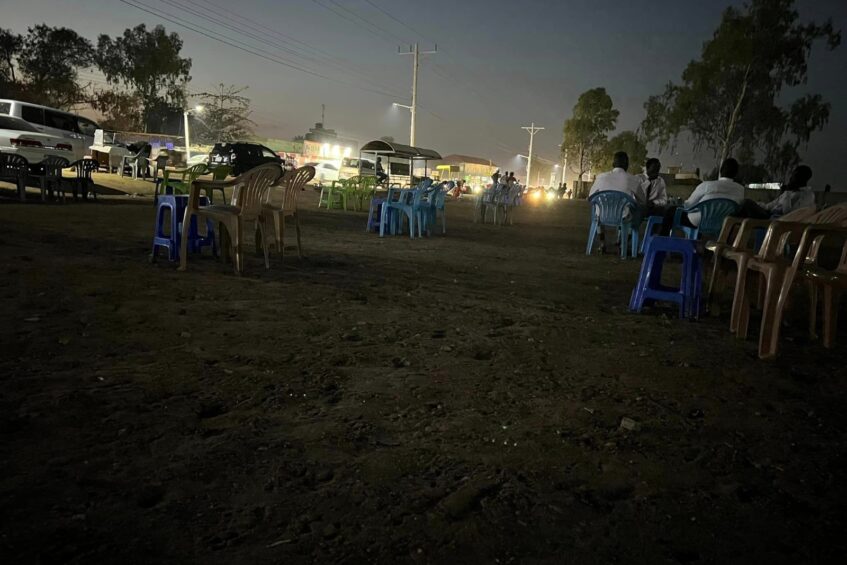
Open tea places at Rainbow Playground. (Michael Daniel)
Some women selling tea at open places during late hours in Juba on Saturday lamented a recent City Council order banning them from operating beyond 10 PM saying it amounts to stripping them of their livelihoods.
Tea and soft drink makers in the city have been operating inside playgrounds, roadsides and under trees in the evening hours creating spaces for socializing and relaxation.
However, on Thursday, Juba Council Supervisor Martin Simon Wani, limited the working hours to only 10:00 pm.
Wani, also the Chief Executive Officer of the City Council warned that violators will pay a fine not exceeding 50,000 SSP, closure of the premises, and confiscation of their utensils.
Meanwhile, the women said late nights are their most profitable times, adding that the order will negatively affect their tea businesses. They appeal to the municipal council to revoke it.
23-year-old Christina (who prefers to be identified by one name) is a single mother selling juice at the Rainbow Playground.
Being the breadwinner of her son and two brothers, the young woman has been working at the playground in order to put food on the table and pay school fees.
“If it was not for this work of selling juice in this playground, my brothers and I would not have been able to study, so I don’t really want this place to shut down,” she said.
Christina completed her secondary school in 2018, and while she could not afford the expenses of higher education, she had to look for means of generating income in order to secure her college fees.
“I am currently paying school fees for my son and my two brothers, and even my university fees, from my work selling juice here.”
“I completed my secondary school exams in the year 2018, but due to the lack of money, I was not able to enroll in the university, but currently, through my work selling juice, I was able to pay the expenses of my education, and that of me and my brothers and joining the university this year,” she added.
Some of the women who had been working in selling tea in the playground spoke about how the work transformed their lives.
Victoria, a tea seller who has worked at the playground since 2020, is currently nursing her sick mother while working to put food on the table.
She said her family has no other mean of survival apart from the tea stall, explaining that in times of rains, they have to sleep on empty stomach.
“Some of us have many problems. For example, my mother is sick, so I stay with her during the daytime hours at home when the children go to school, and I come to work here in the evening so that I can provide for our needs,” he said.
“Do you know that when it rains for days, we do not eat anything? Even my sick mother does not find anything to eat.”
“When it rains, we cannot find shelter. I tried to find a store to rent, but the prices were high, so I preferred to work here. Therefore, I ask the officials in the city council to give us a humane view first.”
In the order, JCC CEO Martin Simon Wani banned the sale of tea and shisha in the open squares during late evening hours over allegations of “prostitution” and insecurity concerns.
“We are receiving a lot of complaints from the people about this bussiness of the tea in the open places, people walk in some of these places up to midnight or even nearly in the morning,” he said.
“It becomes our source of insecurity even to the people, so people say city council must do something about it, so we discussed this in our security meeting.”
“Sometimes when people are closing their shops and see them opening their business and it became now and connected with this business and promotion of prostitution.”
But Victoria said open squares are not only a source of survival for struggling families, but also reduce the presence of men in bars.
“This place helped provide for our families’ needs, in addition to reducing the presence of men in the bars. Many meetings are held here, such as marriage meetings and church meetings, and they come and buy tea from us and even help us, so I do not wish to close this place.”
Another tea seller is Regina, the wife of a soldier, who said “I had to work because my husband’s salary was irregular and did not meet the needs of the house.”
“Sometimes days I get about 20 thousand pounds, so I save some and use the rest for household expenses We work every day until ten in the evening so that we can provide for our family’s needs.”
Support Eye Radio, the first independent radio broadcaster of news, information & entertainment in South Sudan.
Make a monthly or a one off contribution.
Copyright 2024. All rights reserved. Eye Radio is a product of Eye Media Limited.